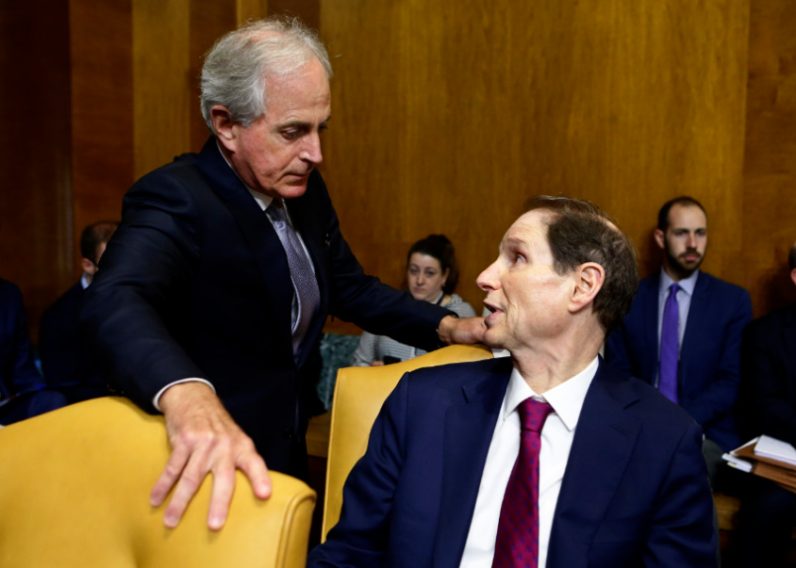
U.S. Sen. Bob Corker (left), R-Tenn., and Sen. Ron Wyden, D-Ore., speak Nov. 28 after the Senate Budget Committee voted on the markup of fiscal year 2018 budget reconciliation bill on Capitol Hill in Washington. The Senate also was preparing to vote in December on tax cut legislation, which 2,400 religious leaders called “fiscally irresponsible.” (CNS photo/Joshua Roberts, Reuters)
WASHINGTON (CNS) — More than 2,400 religious faith leaders, including hundreds of Catholic women religious and dozens of priests, asked the U.S. Senate to vote down tax cut legislation.
In a Nov. 29 letter to senators, the leaders called the bill “fiscally irresponsible” and said that it “endangers our country’s economic health.” The letter added that the Tax Cuts and Jobs Act “disproportionately benefits the wealthy at the expense of vulnerable people and low-income families.”
The letter expressed concern that the legislation, with its complexity, was “being recklessly rushed through Congress” without enough time for review by voters.
[hotblock]
The correspondence was sent under the auspices of the Interreligious Working Group on Domestic Human Needs and the Interfaith Healthcare Coalition. It was addressed to Sen. Mitch McConnell, R-Kentucky, and Sen. Charles Schumer, D-New York, Senate majority and minority leaders, respectively.
“As people of faith, we view decisions about tax policy and the federal budget as moral decisions. Simply put, this proposed legislation is fundamentally unjust. If it becomes law, it will result in harmful consequences for those most needing support so as to the benefit of high-income earners and big corporations,” the letter said.
Citing findings by the congressional Joint Committee on Taxation, the faith leaders expressed concern with the bill’s provisions to roll back cuts for low-income earners beginning in 2021, saying that by 2027, they would see a 25 percent tax hike. The bill calls for tax cuts to remain in place for upper-income earners.
The letter pointed to the bill’s repeal of the individual mandate under the Affordable Care Act as a concern, saying that it would cause “catastrophic losses in health coverage.”
Other apprehensions raised by the signers include the estimated $1.5 trillion growth in the country’s debt over the next decade because of lost revenues and that they feared spending on social services for poor and vulnerable people would be reduced to compensate.
The letter’s final point addressed the negative effect of the legislation on charitable giving. The signers contend that because tax filers would be less likely to itemize taxes under new rules, fewer people would benefit from making charitable donations.
Among Catholic signers were Sister Simone Campbell, a Sister of Social Service and executive director of the Catholic social justice lobby Network; Sister Helen Prejean, a member of the Congregation of St. Joseph; retired Auxiliary Bishop Thomas J. Gumbleton of Detroit; Patrick Carolan, executive director, Franciscan Action Network; and Lawrence Couch, director, National Advocacy Center of the Sisters of the Good Shepherd.
The letter was released a week after Bishop Frank J. Dewane of Venice, Florida, chairman of the U.S. bishops’ Committee on Domestic Justice and Human Development, called some provisions of the bill “fundamentally flawed” in a letter to senators.
While supporting some sections of the bill, he urged the rewriting of provisions that “will raise income taxes on the working poor while simultaneously providing a large tax cut to the wealthy.”
PREVIOUS: Fixing the system doesn’t mean demonizing immigrants, archbishop says
NEXT: SNAP apologizes to St. Louis Archdiocese, priests over false abuse claims


Dollars & “Sense” — more jobs in a growing economy means more ability by charitable organizations to help the needy. Have we become so “government dependent” that we can’t look at this except through political eyes?!?!
Week after week, CatholicPhilly might just as well be the Philadelphia Inquirer beating the Social Marxist drum of “Social Justice.”
Where, pray tell, were the concerns during Obama’s 8 years when spending from Obama’s Democrat Administration added $10.5 trillions to the national debt?
In return for Pope Francis, Archbishop Chaput and the American Catholic Conference of Bishops throwing Americans who believe in the federal rule of immigration law to be enforced; who believe in ‘Regular Order’ to be used in the federal budget process instead of continuing resolutions; who believe that tax dollars shouldn’t fund abortions, we have a Leftist Royal Priesthood under Francis rule.
In return, I’ll not contribute a penny to Catholic Relief Services, the Archdiocese of Philadelphia or others that support Social Marxism.
Nuns on the Bus. All I need to know.
It makes me sad that a Catholic Archdiocesan Newspaper would actually present this nonsense to Catholic people. Just to look at the names of the people like Gumbleton and those groups of nuns who support this petition scares the heck out of me about the future of Catholic Social Teaching.Cardinal Bernadin started all this Un-Catholic Nonsense with his Seamless Robe hypotheses. Catholic Philly should not be part of this.
Just because you don’t like or agree with the Catholic signers does not mean they are wrong. Catholic Social Teaching and the Bible are clear that we need to have a special concern and love for those struggling and for the poor. Does this bill put those who are suffering and poor at the center or does it push them aside? That’s what we are to focus on-not on whether or not you like the signers.